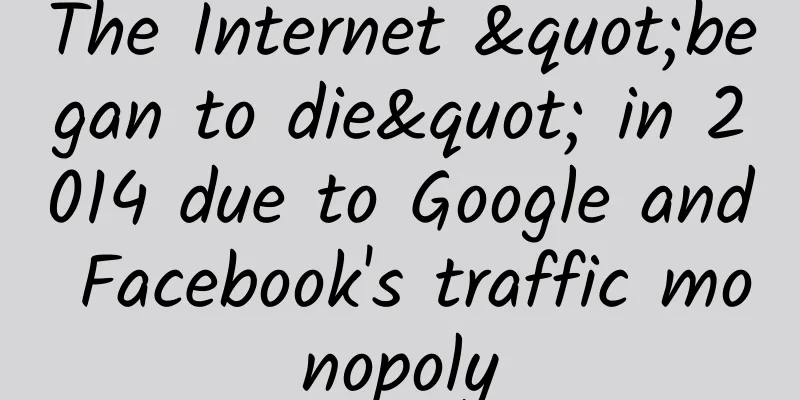The Internet "began to die" in 2014 due to Google and Facebook's traffic monopoly

|
Before 2014, a lot of people used Google, Facebook, and Amazon. Today, a lot of people still use the services of these three tech giants. Not much has changed, and literally the user interfaces and features on these sites have remained pretty much the same. However, the underlying dynamics of power on the web have changed dramatically, and these three companies are at the center of a fundamental transformation of the internet that will ultimately destroy it. Internet activity itself has not slowed down. It has continued to grow steadily, both in the number of users and the number of websites. What has changed over the past four years is the market share of web traffic. Google and Facebook now directly influence more than 70% of web traffic. Mobile Internet traffic now accounts for the majority of traffic worldwide, and in Latin America alone, Google and Facebook services accounted for 60% of mobile traffic in 2015, growing to 70% by the end of 2016. The remaining 30% of traffic is shared between all other mobile apps and websites. Mobile devices are primarily used to access the Google and Facebook networks. The way media sites get traffic also shows that Google and Facebook are in a dominant position on the Internet. The most popular web media resources that do not belong to Google and Facebook usually come from media. For example, there are six media sites in the top ten websites in the United States, and there are also six media sites in the top ten in Brazil. Where do media sites get traffic from? Before 2014, search engine optimization (SEO) was a common practice for web developers to improve Google search websites because it accounted for about 35% of traffic, while more than 50% of traffic came from other places on the web. In 2014-2016, Facebook's traffic grew by about 45%, surpassing search traffic. In 2017, media completely relied on Google and Facebook for web browsing because they were the channels for most of the traffic.
|
<<: Fault recovery and resource allocation in software-defined optical networks
Recommend
The significance of SDN deployment in developing countries
If you haven't been to Brazil, you should go ...
WebHorizon: $10.56/year-256MB/5G SSD/200GB/Japan VPS
WebHorizon is a foreign VPS hosting company estab...
How does user-mode Tcpdump capture kernel network packets?
[[422515]] This article is reprinted from the WeC...
Operators deepen 5G business layout based on cloud computing
In 2018, the global cloud computing market size e...
In the era of stock management, operators still need to provide refined services
Recently, the three major operators announced the...
Which broadband operator do you use at home?
My hometown is in the rural area of Hebei. My b...
4G has not been retired yet, but the global 5G network speed has begun to shrink: down by 39%. What do you think?
Have you used 5G? How does the network speed feel...
One year after the license was issued, China's 5G commercialization yesterday, today and tomorrow
A lot can change in life in a year, and for the 5...
Huawei: 5.5G is the only way for 5G network to upgrade and evolve
On March 2, MWC 2023 was held in Barcelona, Spa...
Will the withdrawal of 2G network affect you?
I remember in 2018, my father's mobile phone ...
BuyVM: AMD Ryzen KVM small amount of restocking starting at $3.5/month, 1Gbps unlimited traffic, Las Vegas/Luxembourg, etc.
BuyVM's low-end VPS packages are currently be...
How difficult is it for a woman to work in communications?
It is well known that the number of women working...
Soul-searching question: How many HTTP requests can be sent through a TCP connection?
A classic interview question is what happens from...
Channels: Operators’ Breakthrough Skills in the 5G Era
An operator executive once believed that user gro...
Interpretation of the 2017 Global Data Breach Cost Research Report
In early July, the 2017 Global Cost of Data Breac...









